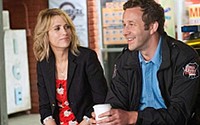 The illusion of chaos
The illusion of chaosKristen, Chris, Rose, Melissa and Paul invite us to the wedding... • Page 1 of 2

London junket: Wiig, O'Dowd, Byrne, McCarthy and Feig.


KRISTEN WIIG
22.Aug.73 • Canandaigua, New York






CHRIS O'DOWD
9.Oct.79 • Boyle, Ireland






 They walk into the room with smirks on their faces, visibly enjoying the buzz surrounding their new film Bridesmaids, which is already a certified hit in America and is getting even more glowing reviews from critics abroad. Actor-cowriter Kristen Wiig leads the charge with costars Chris O'Dowd, Rose Byrne and Melissa McCarthy, plus colourful director Paul Feig. And as they gleefully interrupt each other to talk about making the film, which was clearly a lot of fun, Rose barely gets a word in. Sorting this into a sensible Q&A isn't easy...
They walk into the room with smirks on their faces, visibly enjoying the buzz surrounding their new film Bridesmaids, which is already a certified hit in America and is getting even more glowing reviews from critics abroad. Actor-cowriter Kristen Wiig leads the charge with costars Chris O'Dowd, Rose Byrne and Melissa McCarthy, plus colourful director Paul Feig. And as they gleefully interrupt each other to talk about making the film, which was clearly a lot of fun, Rose barely gets a word in. Sorting this into a sensible Q&A isn't easy...
This script had been in the works for quite a while. How did you and Annie Mumolo develop the story?
Kristen Wiig: Well, I think the collaboration started at the very beginning. We worked with Judd [Apatow] to write the script, and then when Paul [Feig] came along, we worked with him. It was all very collaborative; no one told someone else what to do or said, "You have to take this out." And then when the cast came along, it was the same thing. We all just wanted to feel comfortable playing our characters, and we encouraged improvising. Annie and I didn't swear by every word in the script; we had so many funny improvisers, so we wanted to use them.

We had so many funny improvisers, so we wanted to
use them.
Is this an unusual working process?
Melissa McCarthy: I've never had that freedom before.
Paul: It's a form that Judd really brought to movies, because it's what we used to really play around with on television in Freaks and Geeks, and he really started playing with it on other pilots he did. But then he brought it into the movie world, and in a way it's one of the best ways to make movie comedy, because there's a freshness and surprise among the performers that then goes to the audience.
Melissa: Now having done it and not having worked like this before, it just seems like, "How is it that everything is not done like that?" When the script is that good and that fully formed, you're not running up and doing everything. You're changing, like, "Yesterday I had some apple juice" to "pork chops"! You can keep surprising each other that way. So all your energy goes into playing the character instead of trying to remember if it's "there is" or "there are".

All I can do is sit back and maybe try to adjust the ship as it’s going along.
Does this mean that everyone's competing against each other?
Paul: Well the great thing when you work with real comedy professionals is that they have the illusion of chaos, but it's not. It's like a dance: everybody knows what to do, how to do timing, when to back off, when to go forward. So my job is to just stay out of the way and not interfere with that natural rhythm, because there's nothing worse than a director who comes in saying, "Oh try this, put your hand over here." It throws it off. All I can do is sit back and maybe try to adjust the ship as it's going along.
Kristen: You have chaos when people have different goals, and I think that ultimately we all had the same goal here.
Paul: I've worked with competitive comedy actors, which is generally when somebody is trying to showboat over somebody else, but with people who were brought up on improv, you're so reliant on the person you're with that if you try to shut them down, it's only hurting you. And the smart comedy performers know that, so it's more exciting to say, "Oh remember that bit that you did? Say that! I'm going to set you up for it." It's give and take in service of the scene.

Helen’s a little Stepfordy.
Rose Byrne: Well, I was going for the role of [the bride] Lillian, and I said to my agent, "Do you think they'll let me go for Helen?" And my agent said, "So you want to have a crack at the bitch?" Obviously! And they very kindly let me audition for both, so I was very lucky. And I think it's much more interesting for the viewer if you like the villain, are intrigued by them and want to see more of them. Helen's a little Stepfordy.
Paul: Well, that's where women-based movies fall apart, with cat-fighting and all that. I also liked that Annie is in such a bad state that she's grafting some of her angst onto Helen. Is Helen a bad guy or is Annie just in a bad place?

HOME | REVIEWS | AWARDS | NEWS | FESTIVAL | Q&A | ABOUT | TALKBACK